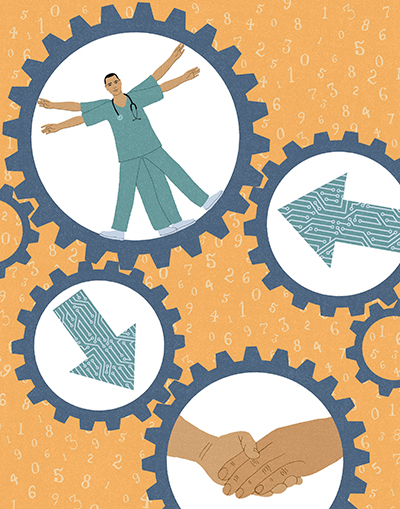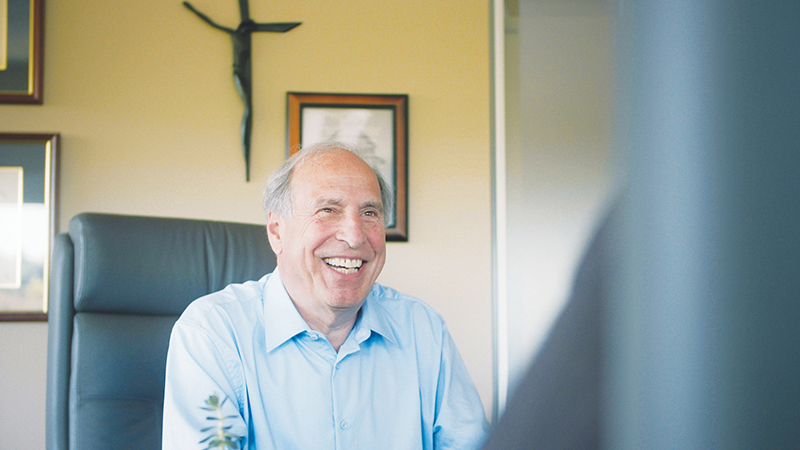
The Catholic sisters who were the primary founders of health care in the United States — for Providence, the Sisters of Providence and the Sisters of St. Joseph of Orange — were courageous, pioneering women. They did not hesitate to brave the unknown to serve those in need and be a source of healing and love in the world. When our founding sisters arrived in the American West, it was still a rugged and harsh frontier. Through discernment and determination, they built hospitals, orphanages and schools.
One can only imagine the times of pivotal change they faced amid nearly 170 years of service, especially in the earliest, most challenging days. For those of us following in their footsteps, our founding sisters have left us with clear expectations to respond to the signs of the times. The Sisters of Providence articulated their vision for the future in their "Hopes and Aspirations for Providence Ministries" legacy document, while the Sisters of St. Joseph of Orange guide us to respond to the changing needs of the world and each community member we serve, who the sisters refer to as the "dear neighbor."

Once Films
The world continues to change in ways our founding sisters could not have imagined. Yet the heart of the mission remains the same: to serve all, especially those who are poor and vulnerable. Health systems know firsthand how responding to the COVID-19 pandemic accelerated the use of technology and changed the landscape of health care access. Now, with the explosion of generative artificial intelligence (AI) driving even more rapid change, the real transformations for health care are imminent.
FORGING A NEW ERA OF TRANSFORMATION
After spending years investing in information technology infrastructure and digital and cloud technology, health systems are ready for rapid AI innovation. In serving all, the founding sisters
expect us to use resources wisely to meet an individual's needs while also reminding us to take risks for the greater good. When we care for the whole person this way, we create healthier communities.
To deliver personalized care in the modern world, health systems must leverage a platform that connects whole-person experiences and behaviors.1 This requires clean, reliable data to drive informed decision-making. Yet only 57% of a health care organization's data is used in key decision-making.2 At Providence, many of our data challenges stemmed from the fact that our ministries were on different versions of Epic, or a separate electronic health record altogether. We also had a few different enterprise resource planning systems for human resources, finance and supply chain. Our varied systems lacked integration, resulting in time-intensive manual processes that often made using our data for critical decisions and comprehensive operations challenging.
Given health care's dependence on data and technology, to streamline and modernize our systems and get them in the cloud, we recruited leaders from some of the most renowned technology companies on the West Coast. Guided by their expertise, we built teams to help identify gaps and create a road map with an aim for Providence to become not only the most innovative organization across health care, but also across industries. To support that strategy, just as COVID-19 was gaining momentum in the U.S. in 2020, Providence opened a global innovation center in Hyderabad, India.
SUPPORTING PATIENT CARE WITH WORLD-CLASS INNOVATION
Investing in global innovation centers is something you may expect from the corporate sector. So why would a nonprofit Catholic health system serving communities in seven western
states take this approach? In their Hopes and Aspirations, the Sisters of Providence remind us that, "as transportation and communication bring us closer together, we hope Providence Ministries will embrace a spirit of collaboration, not competition,
in service of the Mission."3 In responding to changing times, the sisters guide us to reach out to others and new forms of service.
With advanced technology at the heart of delivering personalized quality care to all, ensuring the tools, systems and data our frontline caregivers rely on are fully monitored and maintained 24 hours a day, seven days a week, is another vital way to care for our communities. That's why we established the Providence Global Center (also known as Providence India) in an area of the world that is home to some of the best technology talent and capability centers.4 At the center in Hyderabad, we refer to our technology specialists as caregivers because of the important role they play in supporting our care teams in the U.S.
This team of 1,200 helps us uphold our value of integrity by ensuring the safety and security of patients' protected health information. They also make it possible for us to bring the latest advances to our patients through their expertise in data analytics, AI and machine learning, cloud and product engineering, cybersecurity, software and application development, network operations and lab solutions. Being in a different time zone, they keep our systems securely running around the clock along with information technology teams in the U.S.
Our Providence Global Center specialists can choose to work for any number of prominent technology companies, but they are inspired and called by Providence's mission. Working with their mission leader, the center responds to the needs of their home communities by supporting the Catholic Health Association of India and other local organizations. They are committed to building an inclusive workforce, especially given that women make up less than a third of the world's workforce in technology-related fields.5
One way the Providence Global Center is working to advance women in tech is with Thrive. This six-month return-to-work program helps women professionals who have been on a career break for a year or more to ease back into work and apply for professional roles at the center.6 And the contributions our center's teams are making to Providence's cutting-edge capabilities show their dedication to improving the communities we serve.
COLLABORATION ESSENTIAL TO TRANSFORMING CARE
As digital health innovations continue to accelerate, generative AI has the power to transform care delivery sooner than we think. By leveraging the expertise of our teams in the U.S.
and India, Providence has been thoughtfully leaning into generative AI, and we are already seeing how it helps us take advantage of technology while staying aligned with our value of integrity.
We developed MedPearl, a clinician education and referral platform built directly into our electronic health record that uses generative AI to help advise primary care physicians on caring for and referring patients in need of specialty care. This tool, which was implemented for our providers in 2023, supports clinical decision-making by providing guidance that is continuously updated by primary care physicians and specialists across Providence.7 Also, our Trial Connect program uses augmented intelligence to match underserved patients with our more than 2,500 research trials.8
Generative AI will keep fueling advances like these in everything from patient outcomes and clinical breakthroughs to improved caregiver well-being. The potential is great, especially at a time when health care labor shortages and caregiver burnout are unsustainably high. Even seemingly simple solutions — such as in-basket management to help clinicians triage messages — will dramatically reduce the time they spend on administrative tasks so they can focus on caring for their patients.
Fully realizing the benefits of generative AI requires clean and consistent data. Despite infrastructure investments by health systems, unstructured data in the electronic health record — such as clinical notes and imaging — has long been an untapped resource that could hold the key to major advances in prevention, diagnostics and treatment. Bad actors will also exploit generative AI for their own means, bringing heightened risks for health systems and patients. Clinicians will be responsible for leading the charge in prioritizing the ethical use of generative AI and ensuring the right governance to safeguard patient data and privacy. But in our environment of rapid innovation and a workforce shortage, health systems simply do not have the runway or resources to transform care delivery alone. Partnerships between health systems, the technology sector and other experts will play a key role.
CONTINUING FUTURE COLLABORATION
As a founding member of the data consortium Truveta,9 Providence is collaborating with more than 30 other health systems to use complete, de-identified and clean electronic health record
data to power transformation through AI, predictive analytics and clinical research. Similarly, to keep up with technology and protect against cyberthreats, health systems can seize the opportunity to collaborate on IT support and cybersecurity rather
than duplicating resources.
With our center in India and the digital capabilities and solutions we are developing, Providence is in a unique position to respond to the needs of the dear neighbor and advance our vision of health for a better world by helping other health systems scale innovation and care for their communities. As health systems evaluate their capabilities to understand what they can do well on their own and when it makes sense to partner with like-minded organizations, our door is always open to explore collaboration.
DR. ROD HOCHMAN is president and CEO of Providence St. Joseph Health. Hochman is a former chair of CHA's board of trustees and a recipient of CHA's 2023 Sister Carol Keehan Award. He serves on the board of GE HealthCare and was chair of the American Hospital Association in 2021.
NOTES
- Sara Vaezy, "Distribution and Decentralization Are Crucial in The Healthcare Sector," Forbes, July 5, 2023, https://www.forbes.com/sites/forbesbusinessdevelopmentcouncil/2023/07/05/distribution-and-decentralization-are-crucial-in-the-healthcare-sector/.
- "HIMSS and Arcadia Market Insights Pulse Survey: Healthcare Leaders Know Data Is Key for Decision-Making — But Many Struggle to Take Action," Arcadia, 2023, https://arcadia.io/resources/state-of-healthcare-analytics.
- Sisters of Providence, Mother Joseph Province, "Hopes and Aspirations for Providence Ministries," Caregiver Headlines, 2010, https://caregiverheadlines.org/wp-content/uploads/2024/02/2019-Oregon-Pictures-Providence-Hopes-and-Aspirations-book-SP-logo.pdf.
- "How India Is Emerging as the World's Technology and Services Hub," EY India, January 27, 2023, https://www.ey.com/en_in/india-at-100/how-india-is-emerging-as-the-world-s-technology-and-services-hub.
- "Women in Tech Stats 2024," WomenTech Network, https://www.womentech.net/en-us/women-technology-statistics.
- "Thrive Program," Providence India, https://www.providence.in/careers/thrive-return-to-work-program.html.
- Giles Bruce, "Generative AI Helps Providence Make Specialty Referrals," Becker's Health IT, August 16, 2023, https://www.beckershospitalreview.com/innovation/generative-ai-helps-providence-make-specialty-referrals.html.
- "Trial Connect," Providence National Foundation, https://foundation.providence.org/national/our-priorities/trial-connect.
- Truveta, https://www.truveta.com.
